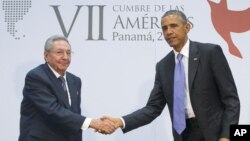In an effort to clarify the United States’ changing policies toward Cuba, two State Department experts took to the popular website Reddit to answer questions from the public.
In December last year, President Obama announced sweeping changes detailed in a White House statement. Those changes took effect in January.
Seth Wyngowski and Benjamin Barron, State Department experts on Cuba sanctions policy, held the AMA (ask me anything) Tuesday to explain what the policy changes mean.
One question many had when Obama announced the changes was “why now?”
“President Obama's new direction on Cuba recognizes that our past approach of isolation has not led to a democratic and prosperous Cuba,” Wyngowski and Barron wrote. “With this new direction, we are replacing isolation with engagement.”
While the officials didn’t speculate on a date for a potential U.S. embassy in Havana, they said there have been discussions with the Cuban government on the topic
“We feel that a U.S. Embassy in Havana will help the Cuban people and advance our interests and we hope to reopen soon,” they wrote.
Other topics are also currently being discussed between the two countries, they said.
“Cuba is discussing with us issues including migration, law enforcement, civil aviation, access to information, the environment, human rights, health, and trafficking in persons,” they wrote. “In late March, for example, U.S. Ambassador Sepulveda visited Cuba for meetings on telecommunications. We hope to identify more areas of mutual concern as our communications continue to grow.”
One measure the Obama administration took was to begin the process of removing Cuba from the list of state sponsors of terrorism. The officials explained the process:
“On April 14, the President submitted to Congress the required report and certification indicating that Administration's intent to rescind Cuba's State Sponsor of Terrorism designation,” they wrote. “The rescission of the designation can go into effect no sooner than 45 days after Congress receives the report and certification [you do the math]. If Congress does not block the proposed rescission within that period, the Secretary of State will then take the final decision to rescind the designation.”
When asked about Cuban immigration to the U.S., the officials said simply that “safe, legal, and orderly migration is still a top priority of the United States” and that “the Cuban Adjustment Act remains in place.”
Another question concerned whether the U.S. would send money to Cuba.
The officials said that the January changes “quadrupled the quarterly remittances limit on Cuban nationals and authorized unlimited remittances to Cuba to support humanitarian projects and to support the Cuban people through activities of independent organizations and to support the development of private businesses.”
And while there are many changes in U.S. policy, the officials were quick to point out that the controversial embargo requires an act of Congress to change.
“As President Obama said in Panama, we encourage Congress to begin the work of lifting the embargo as soon as possible,” they wrote.
Some in Congress, including Sen. Marco Rubio, have voiced opposition to lifting the embargo.
“I don’t know of a single contemporary, reluctant tyranny that has become a democracy because of more trade and tourists,” the Republican Senator from Florida told US News and World Reports in January after Obama called for lifting the embargo during the State of the Union address.
But the State Department officials told Redditors Tuesday that there would be increased opportunities for some U.S. businesses.
“The new regulations create important opportunities for U.S. companies in areas, such as telecommunications, Internet-based services, support for Cuba's nascent private sector, and others,” they wrote. “The U.S. business community has an important role to play in our new approach.”
Travel remains a hot topic regarding U.S.-Cuba relations, but the warming relationship won’t make American tourism in Cuba legal yet.
“Americans are not permitted to travel to Cuba for touristic purposes,” they wrote. “However, Americans are permitted to travel to Cuba for 12 specific purposes, which can be found here.”
When asked about a timeframe for U.S. tourism in Cuba, they answered “No one has a crystal ball, but reintroducing touristic travel to Cuba would require Congressional action. “
And about that burning question of Cuban cigars?
“With respect to Cuban cigars, Americans returning to the United States from Cuba on authorized travel are permitted to import up to $100 in alcohol or tobacco products as accompanied baggage,” they wrote.





